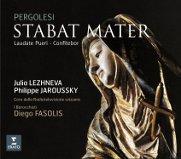Giovanni Battista Pergolesi (1710–1736) wrote his famous work about death as
he approached the premature end of his own life. He is known primarily for
comic operas, notably “La serva padrona” (The Maid as Mistress). “Stabat
Mater,” however, is based on a sacred text written in Latin. It depicts the
suffering of the Virgin Mary as she stands weeping before the cross where
the crucified Jesus is dying.
In fact, the 13th century text had been banned by the Roman Catholic Church
for being too emotional until 1727 when Pope Benedict XIII allowed its use
in the Feast of Seven Sorrows in Lent. Seven years later, a Neapolitan group
associated with Pergolesi’s patron, the Duke of Carafa Maddaloni,
commissioned a new musical setting of the “Stabat Mater.”
Alessandro Scarlatti had composed an earlier adaptation around 1710, in
defiance of the church’s ban. Two centuries before that, Josquin des Prez
and then later, Palestrina had also set the words to music.
The debut performance of Pergolesi’s setting was scheduled for Good Friday,
1736. The composer was suffering from tuberculosis but managed to complete
the work in time. He died shortly afterward at age 26. Pergolesi’s “Stabat
Mater” was written for solo soprano and solo alto accompanied by strings.
On the powerful new recording (on Erato), Diego Fasolis conducts the chorus
Coro della radiotelevisione Svizzera and I Barocchisti orchestra, a period
instrument ensemble.
The remarkable soloists are soprano Julia Lezhneva and countertenor Philippe
Jaroussky. They have performed the work to acclaim in Europe, and this
recording last month won the 2014 International Classical Music Award for
Baroque Vocal.
While the composer may have had two women in mind for the soloists, Lezhneva
and Jaroussky’s voices blend exceptionally well. His voice is so high that
it’s easy to forget that a man is singing.
Just listen to the opening section, which philosopher Jean-Jacques Rousseau
once called “the most perfect and touching duet to come from the pen of any
composer.” While one may question this assessment in light of later music,
with this performance the praise is understandable.
The beauty of the singing is evident throughout—Jaroussky and Lezhneva
easily surmount the technical demands so that the tragic emotions are deeply
conveyed.
The disc also contains two lesser known but worthy psalm settings by
Pergolesi: Laudate pueri Dominum and Confitebor tibi Domine. They are joyful
and provide a welcome contrast to the tragic “Stabat Mater.”
Twenty-four year old Russian soprano Lezhneva is definitely a rising star.
She won the prestigious Mirjam Helin singing competition in Helsinki in 2009
and has been garnering praise for her live performances and recordings.
The New Yorker’s Alex Ross wrote that he “was listening contentedly to
Naïve’s recording label new recording of Vivaldi’s ‘Ottone in villa’ … when
Julia Lezhneva’s rendition of ‘Leggi almeno, tiranna infedele’ sent me
scurrying to the Internet to find out more about the singer.”
I had the same experience listening to the new “Stabat Mater.” Jaroussky is
among the leading countertenors, a strong category since the arrival of
David Daniels (the first countertenor to give a solo recital in the main
auditorium of Carnegie Hall and a star in opera houses around the world).
Diego Fasolis is in the top rank of baroque music conductors.
An upcoming performance to keep in mind is Tuesday, Feb. 25, 7:00 p.m. at
the Grace Rainey Rogers Auditorium in the Metropolitan Museum of Art.
Philippe Jaroussky and the Venice Baroque Orchestra will perform music by
Vivaldi, Porpora, and Geminiani. There will be $1 tickets for kids (ages
7–16) accompanied by an adult purchasing a full-price ticket (maximum three
children’s tickets per paying adult).






